Fluff Fuel Technologies 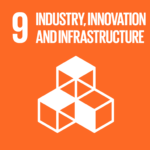
Derived from Waste Plastics
G
uun Co., Ltd. recycles raw plastic materials to produce Fluff Fuels, which provide more eco-friendly, space-saving and affordable options as compared with other types of fossil fuels. Fluff Fuels have a calorific value of 6,500~8,000 kcal/kg and ash content of approx. 10%, and they are most often used as alternatives to coal or heavy oil in paper manufacturers in Japan and cement companies overseas.
The name ”Fluff Fuel” comes from the word fluffy, and they are one of the highest grade of RDF (or Refuse Derived Fuel). The Fluff Fuels are produced through shredding, compressing and packaging (Baling) of:
- Plastics
- Papers
- Fibers
The weight of Fluff Fuel bale is about 560kg/piece.
The current amount of waste plastic disposal is approx. 70 tons per day (TPD), which means the total amount of waste disposal and sales of Fluff Fuels is approx. 22,000 tons per year (TPY). The manufacturing facility started operations in 2008 has a processing capacity of 144 TPD.
In 2013, the company successfully established a pilot project that created a recycling enterprise in Cebu, Philippines sponsored by JICA. It was taken over by Cebu City two years later and is still in operation today. The processing capacity of the pilot plant is 5 TPD.
Major Features and Advantages
I. Lower CO2 emissions than fossil fuel
Fuel consumers such as cement manufacturers or power generation companies can cut back on their CO2 emissions by 17 percent during the heating process by Fluff Fuel rather than coal. That is due to the lower carbon content of Fluff Fuel over coal.
II. Less electricity consumption than Refuse derived Plastic and Paper Fuel (RPF)
The Fluff Fuel production process consumes one-third the electricity required by standard RPF. That is because the Fluff Fuel production does not have a heating and pelletizing process like RPF does.
III. Takes up less space
The needed stock yard area for Fluff Fuel is estimated to be only 60~70% that of RPF due to the rectangular shape of Fluff Fuel bale that allows you to stack up to three layers.
As above, Fluff Fuel is an “Eco-Friendly” alternative fuel.
GUUN, Co. Ltd., founded in 2001, is a waste disposal and recycling company that specializes in creating technologies for producing Fluff Fuel derived from waste plastics and wood chips from various kind of waste wood
Technology Data
Conceivable Applications
Our technologies enable us to recycle raw plastic materials, through the production of Fluff Fuels from various kinds of waste plastics which have been landfilled until now. We shred, separate, and compress plastic waste to produce Fluff Fuel bales.
Fluff Fuels have a calorific value of 6,500~8,000 kcal/kg and ash content of approx. 10%, most often used as alternatives to coal or heavy oil in paper manufacturers in Japan and cement companies overseas.
What is Fluff Fuel:
Fuels from waste plastics are called “fluff,” which is derived from the word, “fluffy.” Fluff Fuels are one type of RDF (Refuse Derived Fuel) which are produced from shredded and compressed plastics, papers and fibers.
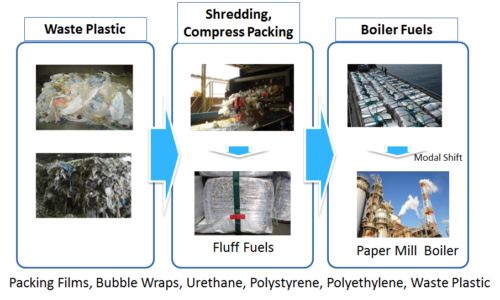
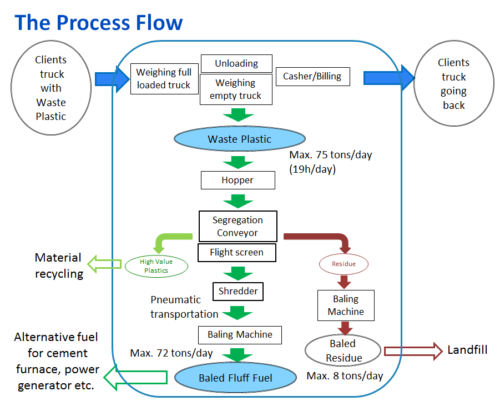
The Process Flow of GUUN’s Waste Plastic Recycling Plant in Cebu
Competitive Advantage
1) Competitive advantage over fossil fuel
*Fuel consumers like cement manufacturers or power generation companies can reduce CO2 emission by approx. 17% in the heating process in their plant by using Fluff Fuel instead of coal. Because the carbon content of Fluff Fuel is lower than that of coal.
2) Competitive advantage over or RPF (Refuse derived Paper and Plastic Fuel)
*The biggest advantage comparing to RPF is that the Fluff Fuel production process consumes approx. 1/3 the electricity required by RPF, because the Fluff Fuel production process does not have a heating and pelletizing process that is necessary for RPF.
**The second point is that Fluff Fuel can be stocked in a smaller space than RPF. The rectangular shape of the Fluff Fuel package allows you to stack up to three units. The necessary stockyard area for Fluff Fuel is estimated to be only 60 – 70% that of RPF.

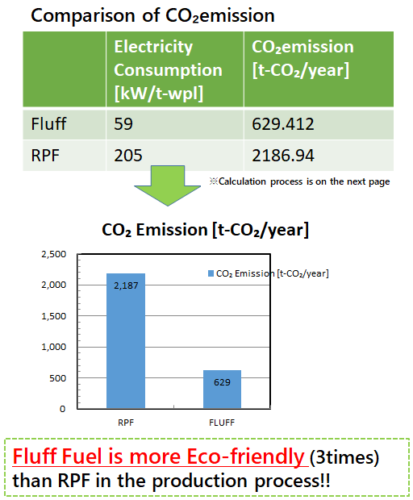
Performance
○Fluff Fuels
・Processing capacity of waste plastic: 144 TPD
・Calorific value: 6,500~8,000 kcal/kg
・Ash content: 10%
・Cl :≦0.5%
・Weight: approx. 560 kg/piece
・Size: 1m x 1.2m x1m =1.2㎥

Transportation by vessel (Modal shift)
Technical maturity / Past record of introduction
Production and Actual Sales of Fluff Fuels:
1) Domestic:
Manufacturing facility in Yokohama was completed in March, 2008.
Amount of waste disposal, sales of Fluff Fuels: 22,000 TPY
Removal and disposal of contaminants to other facilities (PVC, Metals and others): 1,150 TPY
Processing capacity: 144 TPD
Years of operation: 9 years since 2008
2) Overseas:
(1)Pilot Project
A pilot project to establish a recycling enterprise in Cebu, Philippines, ran for 2 years starting in 2013, and the project was taken over by Cebu City in 2015, and has been running so far.
- Amount of waste disposal, sales of Fluff Fuels: Processing capacity: 5 TPD
- Years of operation: 3 years since 2014
(2) Commercial scale plant
A commercial scale plant for Fluff Fuel was completed in May 2017 in Cebu, Philippines.
- Processing capacity: 50~75 TPD
- Years of operation: since July, 2017
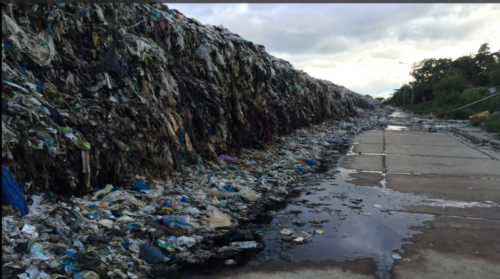
Inayawan landfill site in Cebu, Philippines
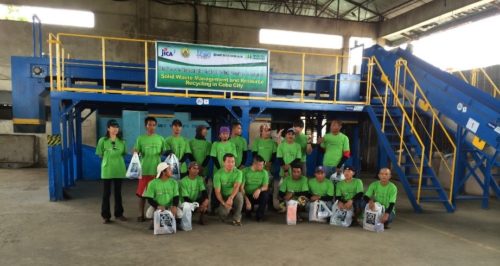
Pilot project for establishing a recycling enterprise in Cebu

Loading waste plastic
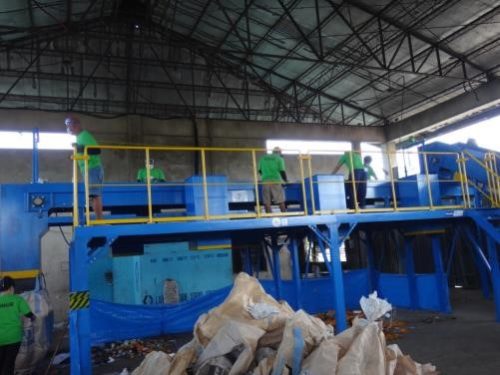
Sorting conveyor

Loading trucks for cement manufacturer from the pilot plant
Conceivable risk
The business could be more sustainable if the client location is closer, because the farther the sales destination, the higher the freight. In our headquarters plant, we deliver the Fluff Fuel directly from the port in Yokohama to each destination. With our transportation know-how, we are able to provide support for equipment installations as well.
Company Data
| Name | GUUN Co., Ltd. |
| Address | 17-3, Torihama-cho, Kanazawa-ku, Yokohama city, Kanagawa pref. 236-0002 Japan |
| Capital |
85 million yen (as of April, 2017) |
| Contact person |
Mr. Toshiki KITAI, Blue Economy Laboratory |
| Number of employees | 100 employees (as of March 1, 2017) |
| Date of company foundation | March 14, 2001 |
| The type of business |
Disposal and Recycling of Waste |
International operation
Number of employees for international operation: 9 employees, including one representation at Philippines Branch
Modality of business transaction
Direct Investment
- As a first stage, we would implement feasibility study to find out the possibility of waste management business in the target area.
- If we find it will be feasible, we would invest in necessary recycling facilities in the area either solely or by joint investment with local companies.
Partnership
- If we find local companies(counterparts) who would like to improve their existing waste management system or recycling system, we would contract partnership agreement with them to transfer our knowledge or technology to the counterparts.
- If we find the improved waste management attractive for us, we would participate in the management or the operation of the business.
Attachments
Schematic illustration of the technology
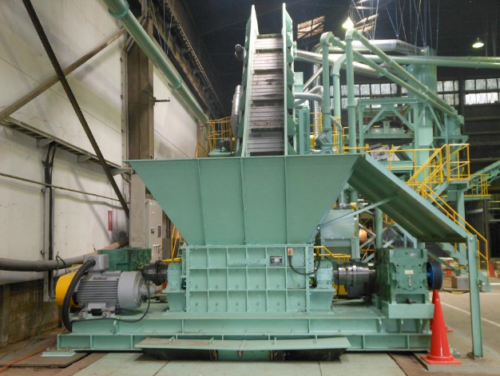
Head office: shredder
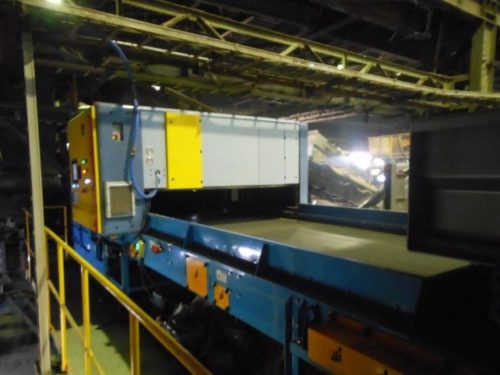
Head office: PVC sorting machine

Head office: air classifier
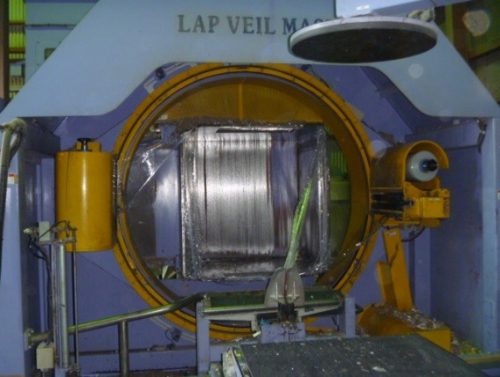
Head office: compressing and packing machine
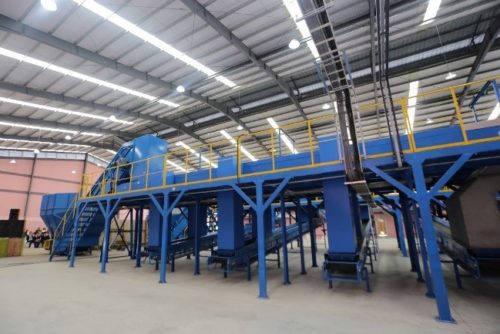
Philippine factory: sorting machine
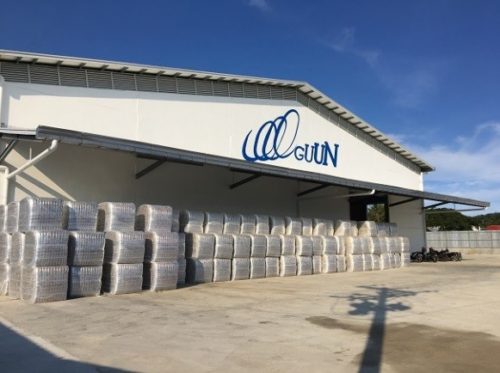
Philippine factory: building and Fluff Fuel
Contact Person(s)
*Please mention that you saw UNIDO's website when making the first contact with the company.
Registered Category
- Environmental Technologies : Circular Economy (3R)

